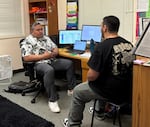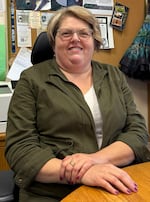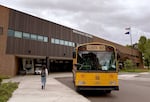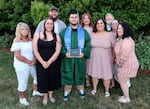OPB has been following 27 students since they were in first grade as part of the Class of 2025 project to track the state's progress toward 100% high school graduation starting in 2025.
Logan is a smart, responsible student who used to love recess as a kid. At the end of first grade, he fondly remembered field day — a kind of extended recess.
“We get to play games and stuff,” he remembered.
When OPB asked Logan what he wanted to be when he grew up, he shrugged. “I don’t know,” he said.
Logan started school at Earl Boyles Elementary in Southeast Portland along with OPB’s Class of 2025, a group of students OPB has been following since first grade, as a way to track Oregon’s goal of 100% graduation starting with that class.

Class of 2025 student Logan in 2017 at a STEAM Fair in 4th grade at Earl Boyles Elementary in Portland, Ore. Logan and his family moved to Salem the following year. He graduated from Salem's McKay High School a year early in June 2024.
Laura Klinkner / OPB
Logan and his family left Portland when he was in 5th grade and moved to Salem. Now he’s a junior at McKay High School, a brand new building with a lot of elective offerings for its 2,200 students.
“It gets kind of cramped sometimes in the hallways, but other than that, it’s good,” he said.
“I definitely have a large friend group and so I know everyone, and everyone knows me — I just get along with everyone there.”
But while Logan had friends at school, he was ready to move on.
“School’s not really my thing,” he said, “so I just want to get out as quick as I can.”
Logan is the first of the students in OPB’s Class of 2025 to graduate from high school. He took an extra English class in his junior year to satisfy the core classes required for graduation. But he also took advantage of a little-known option available to students in Oregon: counting work hours at a job outside of school as elective credit towards graduation.
He graduated earlier this month with the Class of 2024.

OPB Class of 2025 project participant, Logan, graduates from McKay High School on Friday, June 7, 2024, at the Oregon State Fairgrounds in Salem, Ore.
Courtesy of Molly J. Smith Photography
“Today is a pretty celebratory day for me, for my family,” Logan said at McKay’s graduation. “I’m also excited to get out into the workforce, start getting myself out there and try to build myself up a nice career and a future for myself.”
Of the 24 credits Oregon requires to graduate from high school, six of them are elective credits. They can range from art and music to accounting and cooking. But for students who feel they’re too busy working to accumulate a half-dozen electives, the state allows a workaround: students can use time spent working to replace those elective credits. It allows working students to spend less time at school and more time on the job while continuing to make progress toward graduation.
Logan started working at a T.J. Maxx in Salem about a year ago, stocking shelves and interacting with customers. He says his time at work helped him grow in ways he couldn’t have done at school.
“Before I started my job, I was pretty introverted,” he said. “With me having a retail job, one of the key parts is customer help and supporting. Getting that job definitely opened me up a lot more where I feel fully comfortable walking up to a stranger and asking them a question or talking to them.”

Class of 2025 student Logan has been working at T.J. Maxx. For almost a year. His hours worked at the job counted towards elective credit which allowed him to graduate from high school early.
Elizabeth Miller / OPB
He found out about the work experience option by chance.
“I overheard someone talking about it and I was like, ‘dang, I might have to do that,’” he said.
He already knew graduating early was an option — his girlfriend graduated a year before through the Chemeketa Early College program. Logan took a different route to his early diploma, using over 100 hours working at T.J. Maxx to earn two crucial credits.
He fulfilled the rest of his elective credits by taking classes in photography and mixed media, in addition to the other 18 credits Oregon requires in math, English, science, and other subjects.
A small number of students graduate early in Oregon. According to the Oregon Department of Education, about 2,800 students in the Class of 2023 graduated before May 1 of their senior year with a regular or modified diploma. Of those, the majority of students graduated at some point during their senior year. The others, like Logan, graduated before spending even a day of school as seniors.
Oregon’s legacy of strong local control for school districts means every school district applies the work experience credit option differently. For example, Beaverton and Portland Public Schools allow students to use work experience for up to six elective credits. Bend-La Pine Schools allow up to one full credit of work experience. David Douglas sets a limit of two work experience elective credits.
Similar to the variation among school districts, students’ reasons for using work experience for elective credit vary too.
Supporting students in their life outside of school
At McKay High, school staff realize that some students need the flexibility this option offers.
“Our kids are working the fields, working in the fast food restaurants, they don’t have the opportunity to go home and do homework as regularly as the average student,” said McKay counselor Nick Fuimaono. “We recognize that and we try our best to support them in their life outside of here.”

Class of 2025 student Logan talks with his counselor, Nick Fuimaono, in Fuimaono’s office at McKay. Logan had to submit an application and work with his counselor in order to use his work experience for elective credits.
Elizabeth Miller / OPB
But McKay principal Ranae Quiring said it’s not broadly advertised to students that they can bring their pay stub into their counselor’s office to get out of taking an art or career technical education course.
It’s a way for the school to help students meet Oregon diploma requirements while also understanding a teenager’s individual circumstances.
Quiring shares what she calls an “extreme” example, a student who is the “sole breadwinner” of their family.
“Their priority is not school, their priority is to make money, pay for the apartment or the housing, for food, that sort of thing,” she said.
“The work that they do is honored because we realize that that’s part of what their life looks like right now.”
Quiring says having this option helps more students graduate.
Washington recently passed a law allowing students to receive up to four elective credits for work experience. It took effect this past school year. In announcing the plan, Washington’s State Superintendent Chris Reykdal said the plan “honors the differing pathways” students choose.
“Through work experience, students learn employability and leadership skills — skills like interpersonal communication, personal finance, time management, taking direction, receiving critical feedback, and following through on commitments — that support their long-term success in the workforce and in life,” Reykdal said.

McKay principal Ranae Quiring in her office on May 22, 2024. Quiring said allowing students to gain credit for their work experience honors their varying experiences.
Elizabeth Miller / OPB
In Oregon, there is no statewide information about how many students use work experience for credit. But there are differences in which students take advantage of this option.
In the Beaverton School District, officials said the majority of students who earn elective credit through work experience are students who have individualized education programs, or IEPs. In the 2023-2024 school year, 165 students earned elective credit through work experience. Of those students,150 receive special education services.
Portland Public Schools’ guidelines for work experience say the option is for “at-risk youth, seniors in danger of not graduating or other extenuating circumstances that would affect a student’s overall progress in school.”
In Logan’s case, he wanted to graduate early so he could start working more. But he also didn’t want to be at school.
Where there’s student will, there’s a way
Logan’s mom Angelina Bryce said her son was bored at school.
“I think school comes really easily to him,” she said. “And I think the curriculum is very easy, so he just gets things done so fast.”
A big part of why Logan was able to graduate early comes down to Logan himself. He was driven to meet his goal of graduating early.
And he got there despite missing a lot of school.
“My attendance is — it’s not that great,” he said.

A school bus in front of McKay High School in Salem, Ore. on May 22, 2024.
Elizabeth Miller / OPB
But it didn’t affect his grades. Teachers posted assignments online and he completed them at home.
“Once he heard attendance is not a requirement to graduate, it’s just how well you do in a class — he’s like cool, I’ll just keep up on my tests,” Bryce added.
Bryce is right: attendance is not a requirement for graduation. But school officials everywhere say attendance is key to passing classes and earning credits required to graduate. School districts across the country are dealing with attendance challenges, and the consequences of not attending school. Students who miss school in their early years miss out on fundamental lessons in reading and math. Students who don’t attend school consistently in high school are at greater risk of not graduating.
So what does McKay staff say about Logan, who was able to get through high school early despite not attending regularly?
“Attendance is really key simply because a student has to learn how the system works,” McKay principal Quiring said.
If a student doesn’t come to school, Quiring says students don’t get a chance to learn how the system works. But Logan knows how the system works.

Logan, a participant in OPB's Class of 2025 project, steps off the graduation stage on Friday, June 7, 2024, at the Oregon State Fairgrounds in Salem, Ore.
Courtesy of Molly J. Smith Photography
“When you figure out what the system looks like, and you’re able to decide what parts of it you can do, what parts of it you can’t do, and you figure out who to ask and how to manage it, attendance every day as a junior or senior may be able to look different than when you’re a freshman or a sophomore,” Quiring said.
Not every student can graduate early without regular attendance. Students need to be doing well academically for an early graduation to even be a possibility.
Quiring commended Logan for knowing what he wanted and focusing on his goal.
“He kind of didn’t want to have to go to school all this time, he knew what he was capable of and knew what he could do, and therefore, he’s an early grad,” Quiring said.
Graduation day
McKay graduates and their families took over the pavilion on the Oregon State Fairgrounds on a sunny Friday in early June.
Logan, a junior among seniors, sat with his new class at the end of a row, wearing green Nikes to match the green McKay caps and gowns. He wore a royal blue stole with “Mckay” on one side and “Early Graduate” down the other.
“When I was walking up, I was like, ‘please don’t get my name wrong,’” Logan recalled after graduation.
They didn’t. He walked across the stage to cheers.
After the ceremony, he posed for pictures with his family — mom and dad, grandparents, a family friend, a cousin, and his girlfriend, Amirah Holt.
“For Logan, it’s just about achieving the goal,” Holt said. “He seems very nonchalant about it, but I know he’s super proud, I mean his parents … it’s amazing.”
“I’m so proud of him — everyone is.”

Class of 2025 student Logan and his family at his graduation from McKay High School on June 7, 2024. From left to right, Theresa Hoffman, Crista Stewart, Walter Bryce, Logan, Amirah Holt, Angelina Bryce, Scott Ronck, Debra Ronck, Jenn Luppino
Natalie Pate / OPB
The days leading up to graduation were full of emotions for Logan’s mom, Angelina Bryce. Both Bryce and her husband were 16 when they had Logan.
“Now Logan’s 17 going on 18 and it just feels like he has accomplished so much already,” Bryce said. “Watching our first baby graduate high school, it feels like a very proud moment.”
Like Holt, Bryce said she feels like Logan hasn’t quite realized how big of an accomplishment graduating is.
“There’s a lot of people who don’t get to graduate, and we sacrificed a lot to make sure that he lived a life where he only had to worry about school.”
Now that he’s graduated, Logan isn’t sure of his immediate next steps, beyond continuing to work. He’s interested in working with cars.
“I eventually want to build the car that I own,” he said.
Bryce’s biggest hope for her son is that he’s a good person.
“I don’t measure success in money, in things you own,” she said. “It’s things you do with your life, and family, and memories you make along the way. If you can be happy with your life and you can make those memories, then that’s what counts at the end.”
Natalie Pate contributed reporting to this story.



